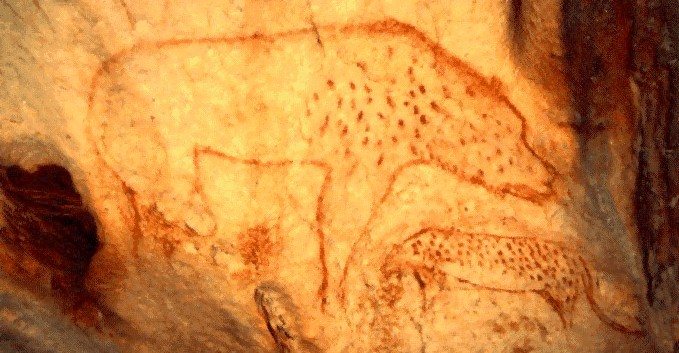
- Carla Hufstedler, Wikimedia Commons
- Cultural evolution in action: 32,000-year-old painting of spotted hyena, Chauvet cave, France.
A few bullet points can sum up the major steps in the history of life on Earth, à la PowerPoint:
(First slide) Genetic Evolution:
• 4.5 billion years ago, Earth coalesced out of dust and gas surrounding the sun.
• 3.8 billion years ago, life arose, in the form of simple replicators.
• 1.5 billon years ago, single-celled organisms with nuclei (eukaryotes) were synthesized from simpler cells which lacked nuclei (prokaryotes); followed half a billion years later by multi-cellular organisms.
• 500 million years ago, early plants and animals emerged from the "Cambrian Explosion."
• 7 million years ago, our "hominid" lineage split off from that of chimpanzees.
(Second slide) Cultural Evolution:
• 200,000 years ago, modern humans appeared.
• 80,000 years ago, language arose (a date much debated).
• 5,000 years ago, the first writing appeared.
• 500 years ago, the printing press was invented.
• 20 years ago, the Internet connected the world.
That's the Cliff's Notes version of evolution. The point is that a mere 200,000 years of cultural evolution makes nearly 4 billion years of genetic evolution look a bit pokey. Suddenly (relatively speaking), new inventions and ideas could flood into a population virtually instantaneously. Knowledge of a poisonous fruit or improved arrowhead could be transmitted to the entire tribe in the space of an evening. Today, of course, the tribe is the whole world, and a breakthrough in, say, solar cell design, whisks around the Internet at the speed of light. Evolutionary biologist Mark Pagel puts the emergence of cultural evolution this way: ... now ideas could arise, and they could jump from mind to mind, without genes having to change ... cultural complexity could emerge and arise orders and orders of magnitude faster than genetic evolution.
The astonishing thing is the speed with which this happened. Two hundred thousand years represents 0.01 percent of the span of life on Earth (equivalent, for instance, to the last three verses of the entire Bible). Thanks to our species' ability to not just learn from others (which dolphins and apes, say, can do) but to pick and choose what's worth learning, human cultural evolution has made genetic evolution practically irrelevant. Once it produced creatures that could trade ideas, "regular" evolution took a back seat while, for better or worse, we showed the rest of creation what a smart, flexible, problem-solving brain was capable of.
Pagel has a worrying big-picture take on the whole process. Early on in cultural evolution, while we were living in tribes numbering 100 or so, it took one inventor to "infect" the rest of the tribe with, for instance, her or his new method for skinning an antelope. That's a ratio of 1:100 "inventors" versus "copiers" per invention. Today we need just one innovator to come up with a great idea, since other Earthlings can copy it by simply tapping into Google or Facebook. Now we have a per-invention ratio of 1:7,000,000,000 inventors-to-copiers. Since it's so much easier to copy than to innovate, says Pagel, we're dumbing down, breeding ourselves into a species consisting of a very few brilliant inventors and the rest of us: several billion mindless copiers.
Barry Evans ([email protected]) acknowledges that this column was copied from other people's ideas.
Comments
Showing 1-1 of 1